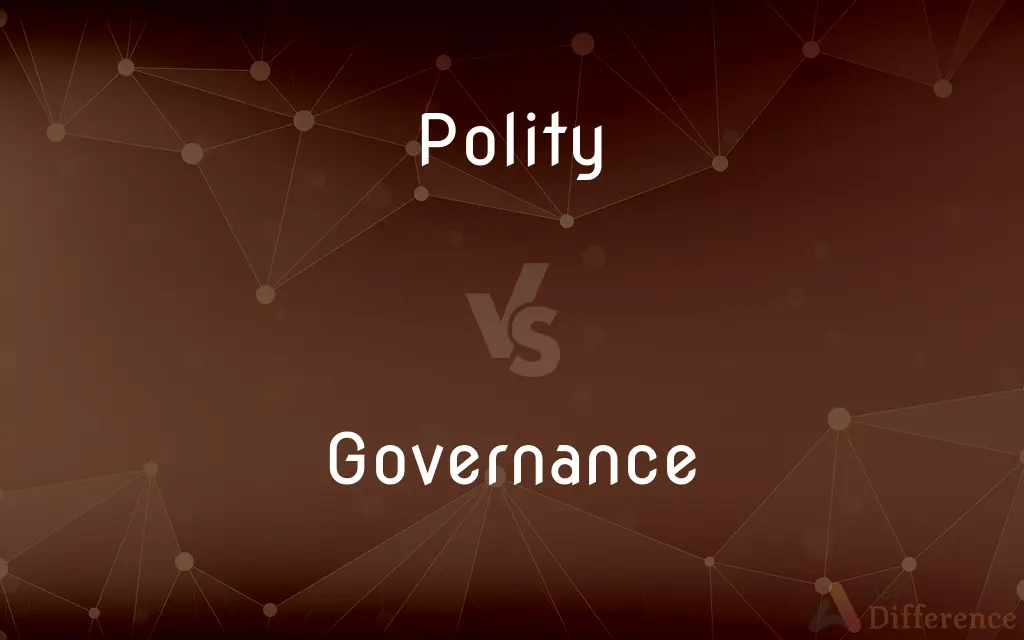Polity vs. Governance — What's the Difference?
By Tayyaba Rehman & Urooj Arif — Updated on April 3, 2024
Polity is a particular form of political organization or society, including its institutions and governance structures, while governance encompasses the processes, systems, and practices through which an organization or society is directed and controlled.

Difference Between Polity and Governance
Table of Contents
ADVERTISEMENT
Key Differences
Polity is a term that describes the form or system of government running within a society, state, or organization. It focuses on the structural aspects, such as the constitution, branches of government, and the distribution of power among them. Governance, on the other hand, deals with the actions, methods, and policies used by those in power to administer and regulate a community, organization, or country. Governance is about how the rules, norms, and actions are structured, sustained, regulated, and held accountable.
While polity lays the foundational framework of a political or organizational system, governance is the dynamic process through which this framework is operationalized. For example, a democracy is a type of polity that is characterized by the rule of the majority, while democratic governance involves the practices that ensure the representation, participation, and accountability of the governing bodies to the populace.
The concept of polity is more static, describing the established form of political organization and its underlying principles, such as federalism, democracy, or authoritarianism. Governance, conversely, is more fluid, reflecting the ongoing processes and interactions among stakeholders to achieve the goals of the polity. Effective governance within any polity requires transparency, responsiveness, inclusivity, and accountability.
Polity can often be discerned through a country's constitution or the charter of an organization, which outlines the governance structure and the distribution of powers. Governance manifests through the execution of powers within this structure, including policy-making, enforcement, and the administration of public services.
Understanding the distinction between polity and governance is crucial for analyzing political and organizational systems. While polity provides a macro-level view of the political or organizational form, governance offers a micro-level insight into how leadership and management practices are enacted within those forms.
ADVERTISEMENT
Comparison Chart
Definition
The form or system of government in a society, focusing on institutions and structures.
The processes and practices through which a society or organization is managed and controlled.
Focus
Structural organization and political philosophy.
Dynamic processes of decision-making and policy implementation.
Scope
Broad, describing the overall political system.
Specific, related to the conduct and operation of governing bodies.
Key Elements
Constitution, branches of government, distribution of power.
Policies, practices, accountability, transparency, responsiveness.
Outcome
Determines the framework within which governance occurs.
Reflects the effectiveness and efficiency of the political or organizational system.
Compare with Definitions
Polity
A specific form of political organization or government.
The polity of ancient Athens was based on democracy.
Governance
The process of making and enforcing decisions in a political community.
Effective governance requires transparency and accountability.
Polity
A collective term for the institutions and structures of a government.
The new polity favored decentralization of power.
Governance
The framework within which public officials operate and interact with stakeholders.
Good governance involves the participation of all societal sectors.
Polity
The concept or philosophy underlying a political system.
The founding documents laid the foundation of the nation’s polity.
Governance
The methods by which a society is managed and controlled.
The new policies were introduced to improve governance.
Polity
The structure or constitution governing a state or organization.
The country's polity underwent significant changes after the revolution.
Governance
The practices ensuring the alignment of an organization’s actions with its goals.
The board of directors is responsible for corporate governance.
Polity
The categorization of government based on its characteristics.
Scholars debate whether the polity should be classified as federal or confederal.
Governance
The dynamic aspect of leading and administering public affairs.
The government focused on governance reforms to enhance public service delivery.
Polity
A polity is an identifiable political entity—any group of people who have a collective identity, who are organized by some form of institutionalized social relations, and have a capacity to mobilize resources. A polity can be any other group of people organized for governance (such as a corporate board), the government of a country, country subdivision, or a sovereign state.
Governance
Governance is all the processes of interaction be they through the laws, norms, power or language of an organized society over a social system (family, tribe, formal or informal organization, a territory or across territories). It is done by the government of a state, by a market, or by a network.
Polity
The form of government of a nation, state, church, or organization.
Governance
The action, manner, or power of governing
Principles of good governance.
Polity
An organized society, such as a nation, having a specific form of government
"His alien philosophy found no roots in the American polity" (New York Times).
Governance
The process, or the power, of governing; government or administration.
Polity
(politics) An organizational structure of the government of a state, church, etc.
Governance
The specific system by which a political system is ruled.
Polity
(political science) A politically organized unit; a state.
Different nations have different forms of polities, from provinces and states to territories and municipalities.
Governance
The group of people who make up an administrative body.
Polity
The form or constitution of the civil government of a nation or state; the framework or organization by which the various departments of government are combined into a systematic whole.
Governance
The state of being governed.
Polity
Hence: The form or constitution by which any institution is organized; the recognized principles which lie at the foundation of any human institution.
Nor is possible that any form of polity, much less polity ecclesiastical, should be good, unless God himself be author of it.
Governance
(management) Accountability for consistent, cohesive policies, processes and decision rights.
Polity
Policy; art; management.
Governance
Exercise of authority; control; government; arrangement.
Polity
The form of government of a social organization
Governance
The persons (or committees or departments etc.) who make up a body for the purpose of administering something;
He claims that the present administration is corrupt
The governance of an association is responsible to its members
He quickly became recognized as a member of the establishment
Polity
A politically organized unit
Governance
The act of governing; exercising authority;
Regulations for the governing of state prisons
He had considerable experience of government
Polity
Shrewd or crafty management of public affairs;
We was innocent of stratagems and polity
Common Curiosities
What is the relationship between governance and political stability?
Good governance practices can lead to political stability by ensuring responsive, inclusive, and accountable governance within a polity.
How does governance affect the effectiveness of a polity?
Effective governance ensures that the structures and principles of a polity are operationalized in a way that meets the needs and rights of the populace.
Is democracy a form of polity or governance?
Democracy is a form of polity characterized by principles such as majority rule and individual rights, which informs the governance processes.
How do polity and governance relate to public administration?
Public administration is a field that studies and implements governance processes within the context of a given polity, focusing on efficiency, public service, and policy execution.
Can the governance within a polity change over time?
Yes, governance practices can evolve with changes in leadership, policies, and societal needs, even within a stable polity framework.
What is the importance of polity in a society?
Polity determines the organizational structure and foundational principles of governance within a society, influencing the distribution of power and resources.
Can a polity exist without governance?
No, polity provides the structure for governance, and governance is the mechanism through which the principles and structures of a polity are enacted.
What role do citizens play in governance and polity?
Citizens are central to both concepts, influencing polity through participatory mechanisms like voting, and engaging in governance through civic participation and oversight.
How do changes in technology affect governance within a polity?
Technology can enhance governance by improving transparency, participation, and service delivery but also poses challenges related to privacy and security.
How does international law influence governance and polity?
International law can provide norms and standards that influence governance practices and sometimes the structure of polity, particularly in areas like human rights and environmental protection.
How do governance and polity impact economic development?
Effective governance within a suitable polity can foster economic development by creating a stable, transparent, and inclusive environment conducive to investment and innovation.
Can there be good governance in an authoritarian polity?
While challenging, some argue that effective governance can occur in various polity types, depending on how power is exercised and the extent of accountability and public service.
What is the difference between corporate governance and political governance?
Corporate governance refers to the practices and policies governing the direction and control of companies, while political governance relates to the administration of public affairs and policy.
How does corruption affect governance?
Corruption undermines governance by eroding trust, efficiency, and fairness in the administration of public resources and services.
What are some indicators of effective governance?
Indicators include transparency, accountability, public participation, rule of law, and efficient public service delivery.
Share Your Discovery

Previous Comparison
Cello vs. Violoncello
Next Comparison
Tortilla vs. WrapAuthor Spotlight
Written by
Tayyaba RehmanTayyaba Rehman is a distinguished writer, currently serving as a primary contributor to askdifference.com. As a researcher in semantics and etymology, Tayyaba's passion for the complexity of languages and their distinctions has found a perfect home on the platform. Tayyaba delves into the intricacies of language, distinguishing between commonly confused words and phrases, thereby providing clarity for readers worldwide.
Co-written by
Urooj ArifUrooj is a skilled content writer at Ask Difference, known for her exceptional ability to simplify complex topics into engaging and informative content. With a passion for research and a flair for clear, concise writing, she consistently delivers articles that resonate with our diverse audience.















































